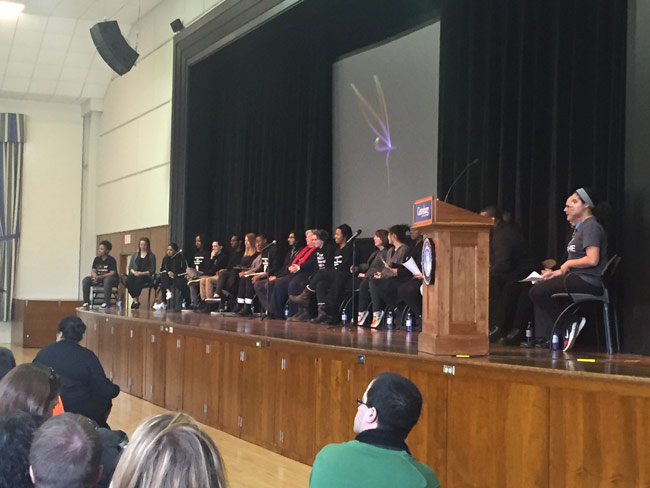A message from a minority class president: To the oppressed and their oppressors

A town hall meeting was organized in January to bring awareness to issues of racism, discrimination and bias on campus. Photo courtesy of gettysburg.edu.
By Anthony Williams, Contributing Writer
I attend Gettysburg College on a full scholarship; the professors here are excellent, and the campus is quite scenic. But social life here at Gettysburg, if you’re a minority, has the potential to leave you feeling like an outsider. When a heteronormative, classist and culturally appropriating Greek system hosts a “Ghetto Fabulous” mixer where students excitedly don baggy clothing or a “Pocahontas” bash where party goers arrive in “festive” Indian costumes (among other pernicious and downright disgusting “themes”), there is a problem. Hearing comments from peers like “nobody really cares about black people” is a problem because in a class of 694 at a PWI (predominately white institution) EVERYONE hates gays, blacks and Latinos, right? That’s how I was elected, of course *insert overly passive aggressive emoji here*. Taking the bigger picture into account, as someone who would like to rush a fraternity, I understand that not all who exist in the Greek system at Gettysburg College fit this troubling image. I also understand that not all of the students in the general student body share this tragic ignorance. It is the minority of the oppressors who disturbs the majority of the oppressed.
My acceptance to Gettysburg and my full scholarship were milestones that did not come to me as prizes for being a minority. As a gay, black and Latino minority at Gettysburg and as the active class president of a class 694 strong at a PWI, I have often felt insecure and have wondered about how some feel about a triple minority such as myself representing them. Now, I kind of like this badass idea of someone with my profile ruffling the feathers of the political climate of some here at Gettysburg, but in all honesty, it shouldn’t have to be this way.
I shouldn’t feel any insecurity and ought to delight in ruffling those feathers and pissing off those oppressive predatory birds. A large swath of Gettysburg students–whether they be white, black, Hispanic, international, gay, straight–get it. Some students actually get it. I mean, the fact that I was elected is evidence that many on campus believe in me despite my differences from them.
Dear other other minority leaders in other overwhelmingly oppressive collegiate climates, such as myself, who face prejudice due to their ethnicity or their parent’s annual income: you are allowed to move on up in the world. It once seemed to me that success was like a mountain: the higher up you got the whiter it appeared. Inevitably, if people aren’t familiar with your culture then they are going to appear ignorant because they are. Period. The responsibility of those who are ignorant is to get educated, and if the oppressed and misrepresented want to be understood then we must seek to understand those who oppress and misrepresent and educate them.
Now, I understand that fear is really at the root of these issues–this putting of minorities and the majority alike into boxes based on what they wear, what they look like, how they talk, what the color of their skin is–in order to feel more comfortable in our own clothes, speech, skin color and culture. When multiple cultures are placed into a box together from considerably different worlds it is (sadly) instinctive and all too familiar to become afraid. So we label people that are different from us in an effort to make ourselves feel more comfortable in our own worlds. This is normal. But students shouldn’t be afraid of each other. Instead, we ought to learn from one another. We ought to embrace differences and celebrate them.
When I competed at the University of Pennsylvania’s Wharton School of Business during Wharton’s annual investment competition (shoutout to Aberdeen Asset Management), I learned lots from the teams from India as they did from me. We came from different levels of education, had different religions, spoke with accents that were alien to one another; we were culturally different. However, we were in the same competition and were united by our common values and passions associated with our mutual interest. Without openly engaging one another we could not be truly intellectual leaders driven by curiosity and diversity in the hopes of learning from one another, and with the ambitions of bettering ourselves and the world around us we weren’t afraid to learn.
As college students and responsible citizens of the world we should strive to exist in a community where differences in color, language, sexual orientation, preferred personal pronouns and the like are celebrated. We cannot be afraid to learn and to accept. Equal opportunity is the first step towards initiating the next big change in our world. Without it, millennials are in for a troublesome cycle of history as it will, yet again, repeat itself due to a simple lack of effort to learn from it.
Gettysburg is a stark example of how change is possible, that it can happen, but is also the poster child for why it needs to happen. To the oppressed: let’s go ruffle some feathers, educate the ignorant and make America great again. To the oppressors: expand your minds, open your hearts and grow the f*ck up.
